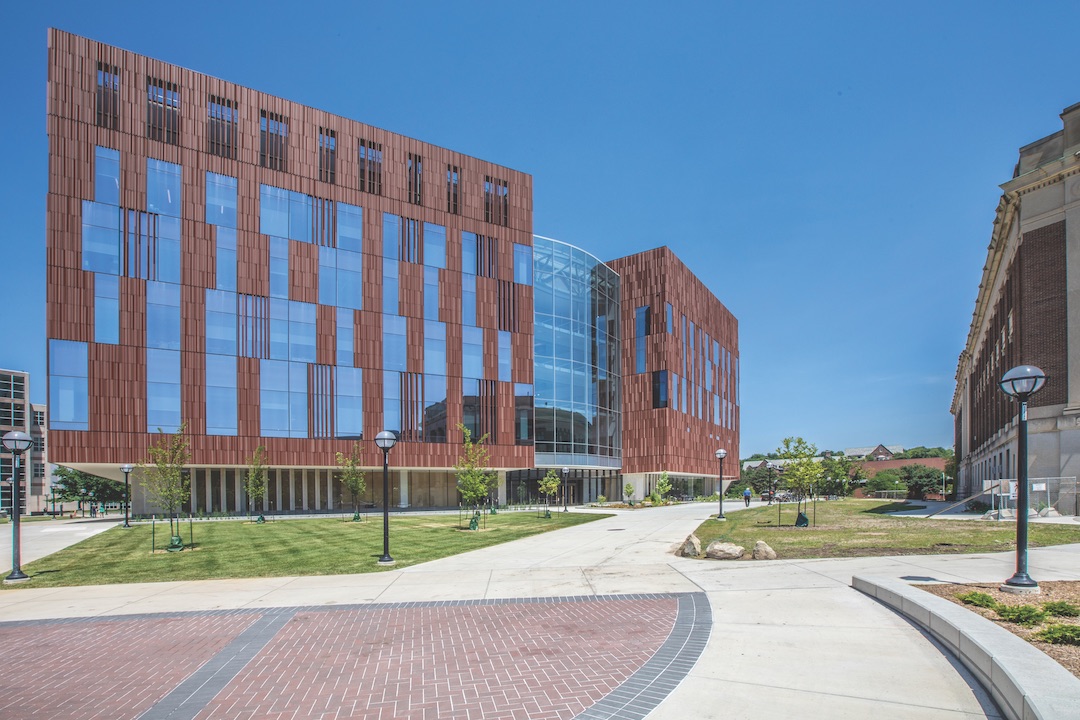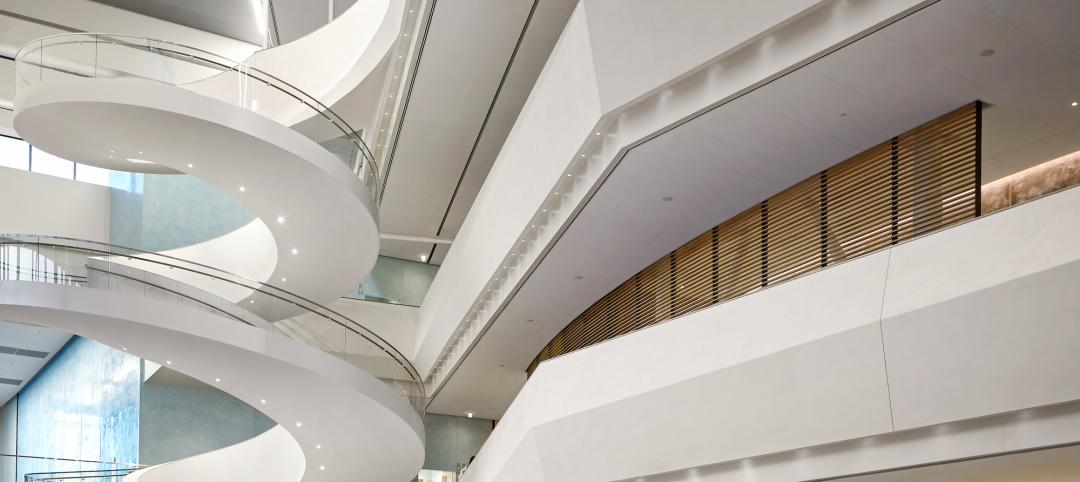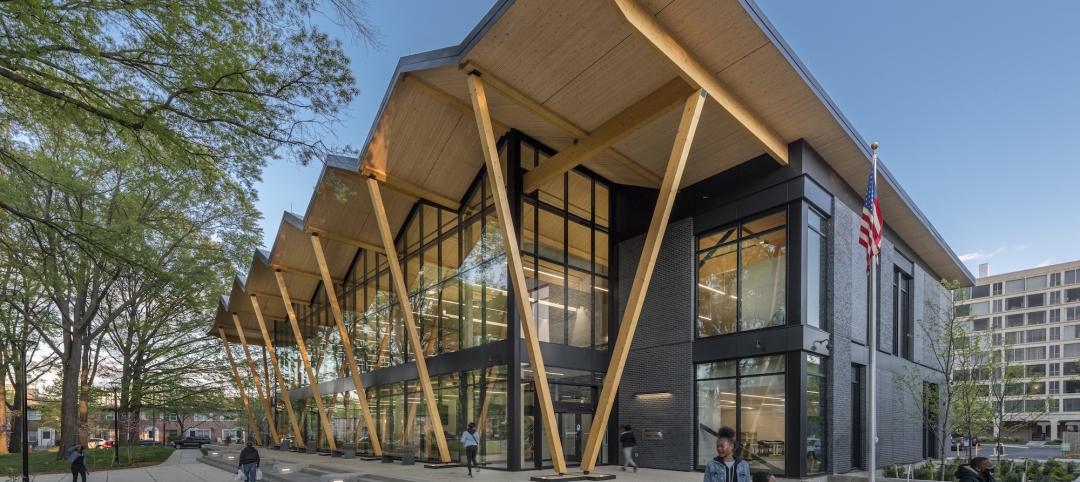State funding of U.S. public higher-education institutions declined by 16% from 2008 to 2017, even as tuition rose an average 35%. Campuses are adapting their facilities to underscore the ROI of earning a degree to a more discerning student population.
Many institutions are emphasizing interdisciplinary research. The University of Michigan’s new Biological Sciences Building brings together the Department of Molecular, Cellular, and Developmental Biology and the Department of Ecology and Evolutionary Biology, as well as the museums of Natural History, Paleontology, and Zoology. Designed by Ennead Architects and SmithGroup, the facility houses large, open classrooms and a flexible active-learning hall for group work.
A 100,000-sf classroom addition to the historic Alexander G. Ruthven Museums Building at the University of Michigan features learning spaces that can quickly transition from lectures to small work teams to larger group discussions.
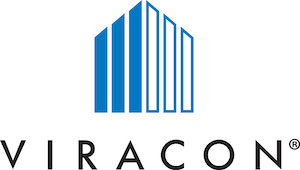 The 2019 University Giants Report is sponsored by Viracon. Also check out these 2019 University Sector Rankings, brought to you by Viracon:
The 2019 University Giants Report is sponsored by Viracon. Also check out these 2019 University Sector Rankings, brought to you by Viracon:
• Top 175 University Architecture Firms for 2019
• Top 90 University Engineering Firms for 2019
• Top 95 University Construction Firms for 2019
“Higher education clients are focusing on creating spaces that can accommodate large, modern, team-based, and active-learning classrooms that also keep an eye on flexibility to accommodate future programmatic changes,” says Rob Rankin, LEED AP BD+C, Project Director, Barton Malow.
Some universities are creating “innovation districts” to historically separate programs. “These districts create holistic living and learning environments, offer a sense of community, and help connect and immerse higher-ed institutions with surrounding communities and professional organizations,” says Patricia Bou, AIA, LEED AP, Principal, CannonDesign.
Rather than committing to an entire new building to house its new engineering program, Loyola University Chicago opted to renovate a storefront adjacent to several off-campus properties. The 9,255-sf Flex Lab is large enough to accommodate the program’s gradual growth while encouraging the exploration of different engineering sciences.
“The highly flexible, reconfigurable space supports entrepreneurial partnerships with students in the community and the university’s social justice mission,” says Chris Purdy, Vice President and Higher Education Practice Director at SmithGroup.
A new 790-space underground parking structure at Washington University in St. Louis is designed with built-in flexibility so it can potentially be repurposed into academic research or teaching space in the future. McCarthy Building Companies laser scanned all the post-tensioning cable, rebar, and embedded MEP systems before concrete was poured on the deck so the university will have access to precise 3D data in the event of future renovation or repurposing.
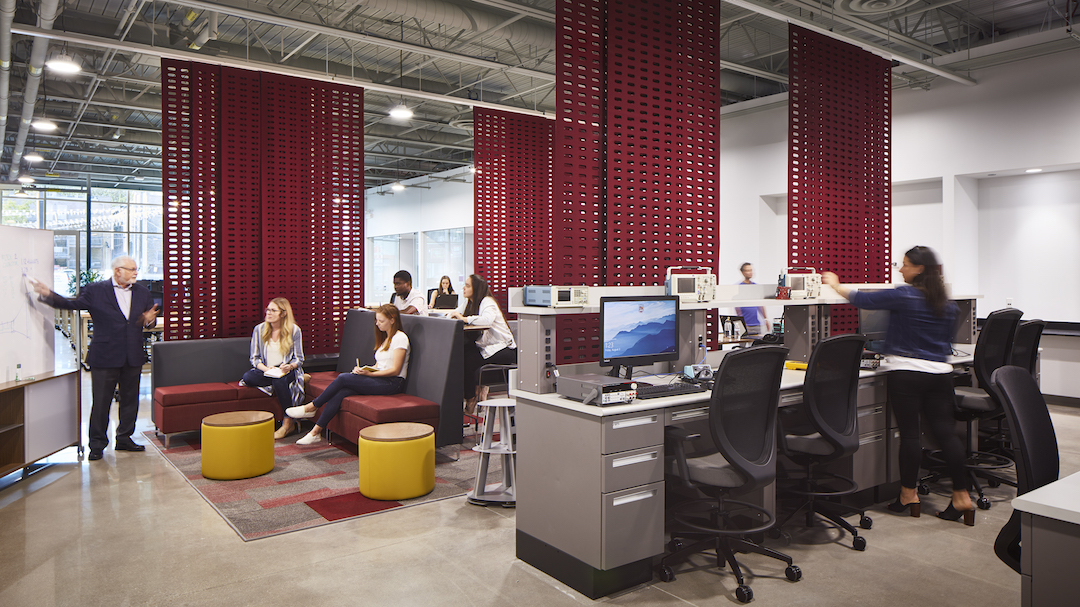 Rather than committing to a new building to house its new engineering program, Loyola University Chicago opted to renovate a storefront adjacent to several off-campus properties. The 9,255-sf Flex Lab was designed by SmithGroup. Photo: Dave Burk
Rather than committing to a new building to house its new engineering program, Loyola University Chicago opted to renovate a storefront adjacent to several off-campus properties. The 9,255-sf Flex Lab was designed by SmithGroup. Photo: Dave Burk
Colleges and universities are also doubling down on academic programs that equip students with hand-on skills for in-demand careers. “Over the last year, we’ve seen an increase in the number of projects related to specific careers,” such as nursing, welding, automotive, automation, and electronics, says Jeff Oke, PE, Principal and Client Executive, IMEG Corp.
Wake Tech Community College opened the first building on a new 94-acre campus in Research Triangle Park, N.C., to help meet rising demand for technology workers in the region’s knowledge-based economy. Co-located with technology, life science, and R&D partner companies, the campus is a collaborative venture built with curriculum guidance and financial support from Cisco, Red Hat, and Lenovo.
“This adaptable building helps fulfill Wake Tech’s vision to be a vital hub between the academic and corporate worlds,” said Kenneth Luker, AIA, LEED AP, Design Principal, Perkins+Will.
Universities and colleges FOCUS ON PHYSICAL, EMOTIONAL HEALTH OF STUDENTS AT RISK
Health and wellness are taking center stage on many college and university campuses to address student anxiety, depression, and substance abuse.
Recent research from the American College Health Association reveals that three out of five college students experienced overwhelming anxiety in the last year; two out of five were too depressed to function. Only 10-15% of students who need help typically seek such services at campus counseling centers.
“Academic institutions are creating wellness centers to provide students more mental health resources than ever before,” says John Baxter, AIA, LEED AP, Higher Education Sector Leader at EYP. The McLeod Tyler Wellness Center at the College of William and Mary, Williamsburg, Va., which opened last fall, integrates counseling, medical, and healthy living spaces in a highly visible and accessible campus building.
There’s also an emphasis on designing for inclusivity, as universities strive to offer customized experiences matched to each student’s unique academic journey. “Universities are engaged in a conscious drive toward multicultural human experience as they recognize evolving campus cultures,” says Charles Smith, AIA, LEED AP, Principal, CannonDesign. “Student unions, dining experiences, and residence halls are being programmed and designed to create more open, collaborative, and supportive environment for all students.”
This fall, Pratt Institute will open Emerson Place, a new 10-story residence hall in Brooklyn designed to address the complex needs of first-year students. Compartmentalized toilet and bathing facilities located outside of traditional doubles sleeping rooms will give students privacy while addressing gender politics, identity, and religious diversity.
“Our clients understand the importance of providing spaces and resources that allow students to decompress or regroup,” says Lynne Deninger, AIA, LEED AP, CannonDesign Principal and Boston Practice Leader.
MORE FROM BD+C'S 2019 GIANTS 300 REPORT
Related Stories
Giants 400 | Feb 3, 2023
Top Workplace/Interior Fitout Architecture, Engineering, and Construction Firms for 2022
Gensler, Interior Architects, AECOM, STO Building Group, and CBRE top the ranking of the nation's largest workplace/interior fitout architecture, engineering, and construction firms, as reported in Building Design+Construction's 2022 Giants 400 Report.
Giants 400 | Feb 2, 2023
Top 20 Integrated Project Delivery (IPD) Construction Firms for 2022
Barton Malow, Gilbane, DPR Construction, and STO Building Group top the rankings of the nation's largest integrated project delivery (IPD) construction firms for buildings construction work, according to BD+C's 2022 Giants 400 Report.
Giants 400 | Feb 2, 2023
Top 100 Design-Build Construction Firms for 2022
ARCO Construction, Hensel Phelps, Ryan Companies, and Swinerton top the rankings of the nation's largest design-build construction firms for buildings construction work, according to BD+C's 2022 Giants 400 Report.
Giants 400 | Feb 2, 2023
2022 Convention Center Sector Giants: Top architecture, engineering, and construction firms in the U.S. convention and conference facilities sector
Clark Group, EUA, KPFF, Populous, TVS, and Walter P Moore top BD+C's rankings of the nation's largest convention and conference facilities architecture, engineering, and construction firms, as reported in the 2022 Giants 400 Report.
Giants 400 | Feb 1, 2023
2022 Cultural Facilities Giants: Top architecture, engineering, and construction firms in the U.S. cultural facilities sector
Populous, DLR Group, KPFF, Arup, and Turner Construction head BD+C's rankings of the nation's largest cultural facilities sector architecture, engineering, and construction firms, as reported in the 2022 Giants 400 Report. Building types include museums, public libraries, performing arts centers, and concert venues.
Giants 400 | Jan 31, 2023
2022 Retail Giants: Top architecture, engineering, and construction firms in the U.S. retail building sector
Gensler, CallisonRTKL, Kimley-Horn, Henderson Engineers, Whiting-Turner Contracting, and Turner Construction top BD+C's rankings of the nation's largest retail sector architecture, engineering, and construction firms, as reported in the 2022 Giants 400 Report.
Giants 400 | Jan 31, 2023
2022 Government Sector Giants: Top architecture, engineering, and construction firms in the U.S. government buildings sector
Gensler, Jacobs, Hensel Phelps, and Page top BD+C's rankings of the nation's largest government sector architecture, engineering, and construction firms, as reported in the 2022 Giants 400 Report.
Giants 400 | Dec 1, 2022
Top 100 Office Building Core+Shell Contractors and CM Firms for 2022
Turner Construction, AECOM, Clayco, and Gilbane top the ranking of the nation's largest office building core+shell contractors and construction management (CM) firms for 2022, as reported in Building Design+Construction's 2022 Giants 400 Report.
Giants 400 | Dec 1, 2022
Top 75 Office Building Core+Shell Engineering + EA Firms for 2022
Jacobs, Alfa Tech, Burns & McDonnell, and Arup head the ranking of the nation's largest office building core+shell engineering and engineering/architecture (EA) firms for 2022, as reported in Building Design+Construction's 2022 Giants 400 Report.
Giants 400 | Dec 1, 2022
Top 150 Office Building Core+Shell Architecture + AE Firms for 2022
Gensler, NBBJ, Perkins and Will, and Stantec top the ranking of the nation's largest office building core+shell architecture and architecture/engineering (AE) firms for 2022, as reported in Building Design+Construction's 2022 Giants 400 Report.


